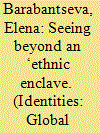| Srl | Item |
| 1 |
ID:
144762


|
|
|
|
|
| Summary/Abstract |
The recent influx of Shan migrants from Myanmar into the city of Chiang Mai, Thailand, provides the conditions for migrant public spheres to emerge. This paper explores aspects of mass-mediated forms of Shan migrant public spheres by focusing on two Shan-language radio stations, one state-run and the other a community station. While much of the literature on public spheres emphasizes the role of the media in allowing citizens to express and publish opinions, it largely excludes those who are marginal to the mainstream public sphere, such as transnational migrant populations. This paper therefore investigates the operations of two Shan-language radio programmes, the community they serve and the effects they have on that community. The paper argues for a need to re-conceptualize the notion of 'the public' as communities of interest, and to expand the notion of the public sphere to include non-citizen space.
|
|
|
|
|
|
|
|
|
|
|
|
|
|
|
|
| 2 |
ID:
143645


|
|
|
|
|
| Summary/Abstract |
Research on Chinatowns stresses the spatial aspects of their production as communal urban spaces. This is particularly evident in the prevailing rhetoric of ethnic ‘enclaves’ that is common in the literature on Chinatowns. This article stresses the importance of taking into account the temporal dimensions of the examinations of space and migrants’ relationships with the city. The argument maintains that, although Manchester Chinatown incorporates many layers of time, only some of them are acknowledged. This view ties both space and people into a particular temporality that is associated with a predetermined culture and tradition. The article shows how relocation from Chinatown to a non-ethnically defined urban area makes it possible for community organisations to depart from the essentialised ethnic, cultural, and social associations produced through dominant understandings of migrant communal space.
|
|
|
|
|
|
|
|
|
|
|
|
|
|
|
|